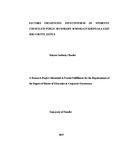| dc.description.abstract | The purpose of this study was to identify the various factors influencing
effectiveness of students’ councils in public secondary schools in Kirinyaga East
Sub-County, Kenya. Five research questions were formulated to guide the study.
Research question one sought to find how the students’ councils election process
influence the effectiveness of students’ councils, research question two sought to
find out how training of students’ councilors influence the effectiveness of
students’ councils, research question three sought to assess how students’
councils’ size influence the effectiveness of the students’ councils, research
question four sought to find out how school size influence the effectiveness of
students’ councils and the last research question sought to assess the influence of
principals’ administrative experience on the effectiveness of students’ councils.
The literature review focused on the effectiveness of students’ councils in terms
of how they operate and in terms of what they accomplish. The study employed
descriptive survey design. The target population consisted of 33 public secondary
schools in Kirinyaga East Sub-County which had 33 principals and 660 students’
leaders. The sample size comprised of 20 principals and 198 students’ councilors.
Self administered questionnaires were used to solicit data from the respondents.
Findings revealed that most students’ councils, 73 percent, were democratically
elected with input from principals and teachers. It was also noted that majority of
the students’ councils were inducted in to their new roles through training- both
formal and informal training was offered. However principals preferred offering
formal training to the students’ councilors. It was observed that the training given
to the students’ councilors was not adequate. The students’ councils were made
of different number of students’ councilors and their sizes were directly
proportional to the students’ body population. The research also concluded that
principal’s administrative experience influenced the effectiveness of students’
councils. The researcher recommended that a well planned and structured training
programme should be organized for students’ council leaders by the principals in
schools. A curriculum of training students’ council leaders should be developed
and implemented in schools to enable them resolve conflicts, perform their duties
with ease, comfortably and effectively. Both formal and informal training should
be offered regularly to induct the students’ councilors to leadership. | en_US |

